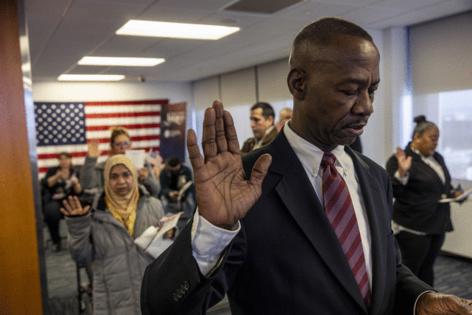POINT: Resolving border crisis requires increasing legal migration
Published in Op Eds
Given former President Donald Trump’s rhetoric during the Republican primaries, we can expect immigration enforcement on our southern border to be a major focus of his presidential campaign.
However, any solution to our border difficulties must entail reforms that make legal immigration a more plausible option for would-be migrants.
In a Super Tuesday speech, Trump said that things are happening that “are unthinkable at the border. … There are millions of people invading our country. This is an invasion.”
Although his rhetoric is extreme, undocumented immigrants had a record 2.5 million encounters with border agents in 2023, causing difficulties for many communities.
Increased enforcement alone will not solve our problems because the root cause of undocumented immigration, in light of the massive economic opportunities for migrants, is a U.S. policy that essentially prohibits legal migration for most people.
According to U.S. Customs and Border Protection, Mexicans accounted for more than 30% of the people apprehended or denied entry at the border over the last four years. Hondurans (9.2%), Guatemalans (9%), Venezuelans (5.8%) and Cubans (5.8%) rounded out the top five nationalities attempting to enter the United States illegally.
The economic gains for low-skilled migrants from those countries are massive. Economists Michael Clemens, Claudio Montenegro and Lant Pritchett estimate that a 35-year-old Mexican male with less than a high school education earns about 2.5 times more in the United States than in Mexico. Guatemalans earn close to 3 times more and Venezuelans 6.5 times more than in their home countries. Although data are unavailable for Hondurans and Cubans, the magnitudes are likely similar.
While the economic gains from migration are massive, no plausible legal path to the United States exists for most people from those countries unless they are a spouse, child or parent of a U.S. citizen. Family connections account for nearly 80% of all legal immigration to the United States. However, visa applications for anyone from those countries with family connections beyond spouses, children and parents are backlogged. For example, 1.2 million Mexican siblings of U.S. citizens are waiting for permission to migrate. Still, only 5,600 of these visas are issued annually.
All of these people will die before they clear a 224-year backlog.
Unskilled workers in those countries rarely qualify for employment-based visas that require special skills, a particular labor shortage or large sums of investment capital. Mexicans, Guatemalans and Hondurans are ineligible for the Diversity Visa Lottery. Although Cubans and Venezuelans are eligible, the chance of winning is only 0.1% to 0.2%.
That leaves asylum or refugee status as the only plausible path to legal immigration for most people. However, only 28,000 refugee visas were approved annually in the decade leading up to the pandemic. Furthermore, to receive this status, immigrants must prove to the U.S. government that they have been or will be persecuted in their country of origin.
Legal immigration is prohibited for most people who try to enter the United States illegally. Legal migration prohibition, like drug and alcohol prohibition, leads to illicit attempts to secure economic gains. As with those other prohibited markets, increased enforcement may decrease the number of illegal migrants, but it will also lead to ever-escalating conflict as would-be migrants and their smugglers redouble their efforts to evade enforcement.
Any long-term solution to the crisis at the southern border must include greater plausible paths for legal migration for low-skilled workers in Latin American countries. These would-be immigrants can’t come to America legally unless we give them a legal “line to get in” so that they have a plausible chance of getting to the front.
____
ABOUT THE WRITER
Benjamin Powell is a senior fellow at the Independent Institute and a professor of economics at Texas Tech University. He is co-author of "Wretched Refuse: the Political Economy of Immigration and Institutions." He wrote this for InsideSources.com.
___
©2024 Tribune Content Agency, LLC







Comments